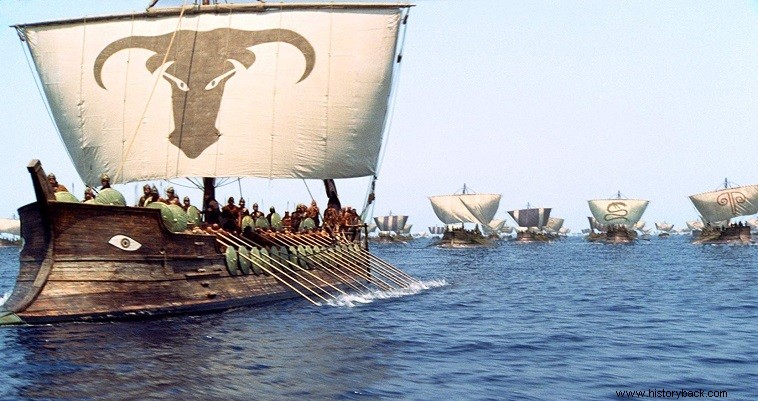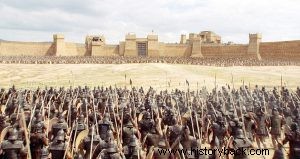
After the abduction of Helen by Paris, which apparently indicates the Trojan naval raid against Laconia and the well-known events that followed, the Achaeans marched against Troy. They assembled their fleet and army at Aulis, opposite Euboia, and from there set out for Priam's castle. The myth does not mention anything about the plou, apart from the episode of Philoctetes.
Then the Achaeans reached the Trojan shores, and with Protesilaus first (the first of the "people," i.e., of the army?), landed ashore. According to the prophecy, the first Achaean to set foot in Troas would fall dead.
Protesilaus knew the prophecy, but nevertheless he landed first and was killed first, by the Trojans, who were expecting the Achaeans, alerted by their outposts on the surrounding mountains. These are exactly what are mentioned in the pre-Iliad Cypriot Epics. But all of the above is nothing but a "lyrical" rendering of reality.
The abduction of Helen certainly indicates the naval raid of the Trojans against southern Greece, in the context of a general war, which was already underway, or simply the carrying out of a pirate raid which was the occasion, the last straw of the wrath of the Achaean.
Herodotus, in his seventh book, compares the campaign of Xerxes with a corresponding one of the Trojans, who came to control all of Thrace, Macedonia and perhaps the northern and central Aegean.
The economically suffocating Achaeans, you should take for granted that they reacted to this expansion of their economic enemies – after all, all wars hide an economic motive behind them. The first battles of the war, perhaps undeclared until then, were certainly fought at sea.
It could not have been otherwise, since both rival coalitions had powerful navies. The Trojans, in this preparatory phase, would probably attempt to blockade their opponents on the Greek mainland, while the Achaeans in turn would attempt to break the blockade, engage their opponents by sea, and exploit an eventual victory by limiting them the Trojans in the Asia Minor peninsula and transferring the war to the "headquarters" of the opponent.
The Mycenaeans seem to have indeed emerged victorious from the naval conflicts and to have managed to regain operational control of the Aegean, but not of the Hellespont straits. Both Abydos and Sestos were, according to ancient sources, supply centers for the forces of Troy, through which supplies and reinforcements - Thracian allied detachments - reached the city.
The above conclusion is drawn, with relative certainty, from the fact that the Trojans, although they are said to have a strong navy, nevertheless did not do the least to intercept the Achaean armada outside their coasts.
Even their chief architect, Phereclus, appears in the Iliad fighting and falling as a mere footman. But Hector also appears from Homer, in several passages of the Epic, reminiscing about the good old days when Trojan ships crossed the seas.
"...So you are like that, with endless stories that you sailed to the point gathering faithful partners, and mingling with foreigners you brought a wise woman from a distant land, the bride of spearmen..." (C 46-49, mtf K. Doukas).
Also indicative of the siege is the passage where Hector complains about the prolongation of the war, which resulted in the sale of valuable objects:"For before Priam the city was called by mortal men multi-gold and multi-copper. Now many relics have been lost from the buildings, and many went to Phrygia and beautiful Maionia to be sold..." (S 288-292, mtf. K. Doukas)
This is what the great Hector exclaims to his cowardly brother Pari, when the latter was afraid to face Menelaus and Polydamatas. The Trojans therefore did not attempt to intercept the Achaean armada because in all probability their fleet had been destroyed before.
It is also impressive that neither in the Catalog of Ships, nor anywhere else, are passages from the Cyclades or the other islands of the Aegean - except for Crete and the Dodecanese - mentioned. This element leads to two possible conclusions.
Either that the Aegean islands had allied themselves with the Trojans, and their armies and fleets were destroyed by the Achaeans, before their invasion of Troad, or that some at least of these islands were under the control of Crete, or of other Achaeans recoverable.
The fact that operations preceded the landing in Troas, even in Asia Minor, is now clear. Both the Cypriot Epics and passages of the Iliad speak of them. There the campaign of the Achaeans in Teuthrania (Mysia) is mentioned, before the Trojans, as well as Achilles' reference to the pre-campaign events - "With the ships and castles twelve I set foot on, and eleven I say on foot, passing through the fruitful Troas" (G 328-329 mtf. Kazantzakis – Kakridis).
Other parts of the epics speak of the capture of Lemnos, Tenedos and Imbros by the Achaeans. In Tenedos, Philoctetes was bitten by a snake, and in Lemnos, the advanced logistics base of the Achaeans, he was abandoned. In Tenedos the Mycenaean fleet was also covered after its feigned departure from Troy.
Lesbos was also captured by the Achaeans before landing in Troad. This is confirmed by another passage of the Iliad, where Agamemnon offered Achilles "seven beautiful captive Lesvides" (I 128-130). After regaining naval dominance in the Aegean, the Achaeans had enough time at their disposal to prepare and move for Troy. The Trojans with their fleet destroyed could only wait for them.

